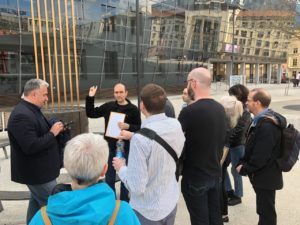In April 2018, the MA Program in Peace, Development, Security and International Conflict Transformation hosted the second meeting of all PESTUGE partners in Innsbruck to discuss and work on matters of relevance as the end of the project approaches.
At the heart of discussions were PESTUGE sustainability strategies and opportunities for future cooperation. Drawing on highly successful project experience deriving from PESTUGE on both, deliverables and mutually respectful relationships among partners, willingness to build on this further in the future was expressed by everyone representing their institutions.
The University of Innsbruck and Trinity College Dublin colleagues facilitated academic workshops attended by all partners. Professors had the chance to work on the articles soon to be published in the peer-reviewed, scholarly Identity Studies in the Caucasus and the Black Sea Region journal. Reflective experiences were shared among the participants and relevant questions were addressed.
A round of discussions on “Trauma, Individual and Large-Group Identity Crises” was facilitated by Prof. Vamik Volkan, the founder and President Emeritus of the International Dialogue Initiative and an expert in matters of collective identity. The expert’s round was hosted at the SOS Children’s Village International, a global federation working with communities, partners and states to ensure that the rights of all children, in every society, are fulfilled. Experiences on peace education were shared, and practices relevant to situations of conflict transformation in Georgia and the Caucasus region were conversed.
Making the most out of the opportunity to learn from each other and the historical events endured, an educational walking tour on “The Politics of Memory: From National-Socialism to Peace Memorials in Innsbruck” took place.
Partners had the chance to meet and discuss PESTUGE sustainability prospects with Prof. Markus Schermer from the Faculty of Sociology, and Dr. Norbert Koppensteiner from the Unit for Peace and Conflict Studies at the University of Innsbruck, and to restate their mutual dedication to sharing knowledge and practices. Bilateral meetings and subcommittees enhanced such an outlook.






